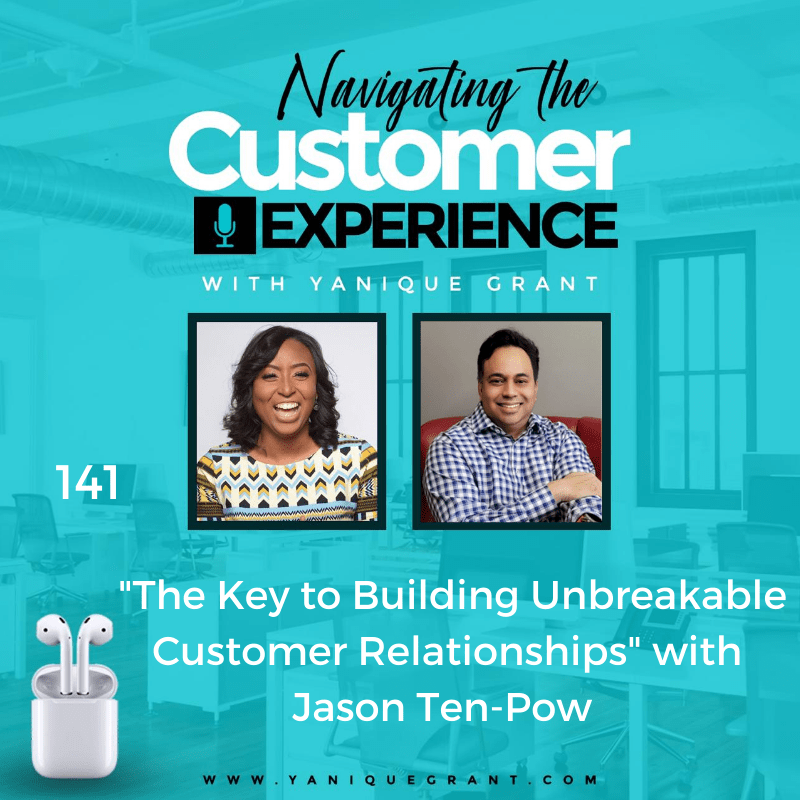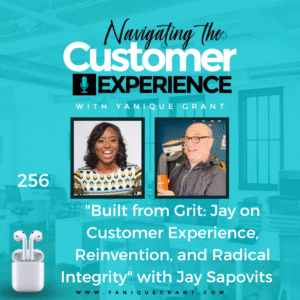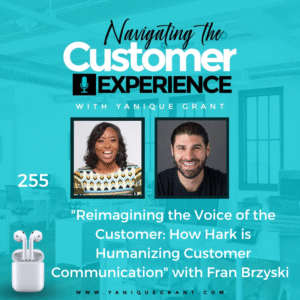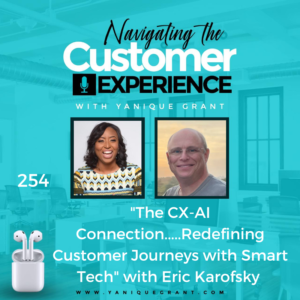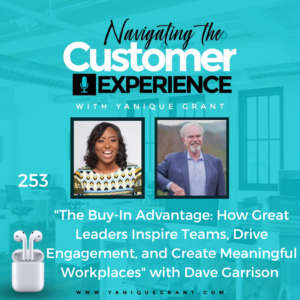Jason Ten-Pow’s passion for customer experience was sparked as a teenager working behind the meat counter of a carnival-themed grocery store in Toronto. Today, Jason is the CEO and President of ONR, the CX consulting firm he founded in 2009. He has a B.A. in political science from the University of Toronto and an M.A. in Quantitative Methods from York University. Jason lives in Toronto with his son Ronin.
Questions
- Could you just tell us how it is that you ended up in the whole realm of customer experience? How did you get where you are today?
- Could you share with our listeners a little bit about the book Unbreakable? What are maybe the key themes that are in the book? And how do you think this book can help a manager or a leader in an organization?
- Could you share with us based on your research what are some of the things that influences customer’s expectations? And then maybe also just touch on why do you think emotions plays such an integral role in somebody making a decision? And are there other factors that come into play? And if other factors come into play, do emotions out-weigh those other factors? Or do emotions always take the greater portion of the decision-making process?
- Could you share with us what’s the one online resource, tool, website or app that you absolutely can’t live without in your business?
- Could you also share with us what is maybe one or two books that you’ve read, it could be that you read maybe a very long time ago or one that you read recently, that has had the biggest impact on you?
- Could you also share with us maybe one thing that’s going on in your life right now, either something that you’re working on to develop yourself, or you’re working on to develop your people, but you’re really excited about it.
- Where can listeners find you online?
- Do you have a quote or saying that during times of adversity or challenge, you’ll tend to revert to this quote, it kind of helps to get you back on track, or just get you refocus if you feel derailed for any reason. Do you have one of those?
Highlights
Jason’s Journey
Jason shared that it’s interesting, it’s been a long and sort of winding road to get here but it’s been fascinating nonetheless and he’s learned a lot. It started out just being in customer experience and working customer experience in retail positions at a number of different companies early in my career, even in High School, he’d be looking and as he’d worked at these retail locations, he’d be seeing how different customers were treated and look at how customers responded to different treatment.
And you’d see certain customers that come in every week, and you wanted to know, what was it that got them there? Was it just force of habit? Was it all these other sort of things about their actual experience in the store that brought them back again, and again. And when he went into University, started to study public opinion, voting and decision-making theory and looking at how people made decisions. And it was really interesting to see, you’d always think that people are rational decision makers, that they would think, look at all the options and then choose the best option.
But as he went through a lot of these studies, what stood out for him was that there are just too many options out there and too many options available for individuals when making a decision. So many times, shoppers, or people who are making decisions are forced to take shortcuts. And what he found, what was fascinating is the shortcuts that most people take are ones that are steeped in emotion and it’s these emotions that drive through decision making.
And as he did more and more research around that, he just found that that seemed to provide the key explanation as to how people make choices and how they make decisions, especially in today’s very fast-moving world. And so, as he started working, he started working after graduate school, he did his graduate work in quantitative methods, which is a really cool name for math basically, and he tried to measure how people make decisions and trying to actually create an algorithm around how to measure the influence of decision making.
And so, his natural progression into the workplace was to actually follow in those footsteps. At first, he worked for a company that did a lot of market research, digital market research, and over time that evolved into really focusing on “Okay, what are the influences of this decision making that customers are making?” And then that naturally came back around 360 degrees and started looking at people’s emotions, and what drives people emotions, and what drives them to make the decisions that they do.
And so, founded the company that really was focused on understanding the emotional underpinnings and how to establish and grow and deepen these relationships by delivering on the expectations of these customers. And a lot of these expectations were not sort of just the delivery of a product or service, but actually to make a connection and to deepen a relationship with them was through understanding their wants, needs and desires, and what are the emotional triggers that are associated with these things. And then how to capture their emotion and how to capture their attention, not just their awareness and to be able to build a relationship and to strengthen relationship and how to grow a brand and increase revenue and profits because most people think, falsely so that having good customer experience is just a feel-good movement, it doesn’t actually have any sort of impact on the business, but that couldn’t be further from the truth.
Great customer experience, actually, is what builds deeper relationships that drive revenue and profit. So, these are the things that they think about, and they talk about, and they help brands as they drive their strategy to deepen relationships with their customers.
The Book “Unbreakable” – What are the Key Themes and How Can the Book Help a Manager or a Leader in an Organization
Me: Amazing. So, I was lucky enough to get a copy of your book Unbreakable. I am in the process of reading it but I love it, it’s been so intriguing since I started reading it last week, it’s really, really got some great nuggets in there. So, could you share with our listeners a little bit about the book? What are maybe the key themes that are in the book? And how do you think this book can help a manager or a leader in an organization?
Jason shared that he’ll talk a little bit about why he wrote the book and it’s really interesting. There’s this misconception as he just mentioned that customer experience is a feel-good investment, it has and it’s not just a field, but what this book sort of walks through is the fact that it’s not a feel-good investment, it’s more than that. Only 6% of brands have actually reached the highest level of CX transformation, which means they’re building unbreakable relationships with their customers.
So, he really wrote this book for the other 94% of organizations out there that are really looking to build these unbreakable relationships with their customers, and aspiring to crack the code of how to link these relationships with increase revenue, profits, efficiency, and employee satisfaction.
And finally, how to create a playbook to transform your organization from one that has in its interest, the prioritization of the customer to one that actually lives and breeds prioritization of the customer, and actually is able to see real dividends from deepening their relationships with customers.
Factors that Play an Integral Role in Making Decisions
Me: So, you spoke earlier when you were talking about your journey and how you got to where you are today, that emotions play a very integral role in customers making decisions. And you also mentioned expectations, which I think is so important. Could you share with us based on your research what are some of the things that influences customer’s expectations?
And then maybe also just touch on why do you think emotions plays such an integral role in somebody making a decision?
And are there other factors that come into play? And if other factors come into play, do emotions out-weigh those other factors? Or do emotions always take the greater portion of the decision-making process?
Jason shared that that’s a really complex question. And he can give you a very logical and very easy to follow example. We go to the store every weekend to buy groceries and we make decisions all the time when we look at the shelf, about things that we want to purchase, things that we need to purchase and things we would like to purchase. What makes us take that extra step of actually going and picking up a product and putting it in the cart.
When we think about that entire process, a lot of it is steeped in emotion, it’s like, “Oh, wow, this package looks a little bit more appealing than the next package.” Or “This is something I need today because I need to pick me up.” It’s all about our state, we’re human creatures, and human creatures, we have wants, needs and desires, but these wants, needs and desires are governed by our emotional state.
So yes, there are real practical implications around the decisions we make, “Hey, I need to buy mustard today but what brand of mustard I will purchase or what type I will purchase?” It’s going to be influenced by something above and beyond that. So what is it? Is it I’m looking at all the different options on the shelf, there may be an entire shelf or row of different brands of mustards. Does my past experience play into it? Absolutely. But there’s also that immediacy of, “Hey, this looks like an interesting product, this looks more visually appealing.” Those are all aspects of our motion.
Now, when we take that one step further, and think about when we go into a store to shop, if we’re greeted at the front by a friendly face, now all of a sudden, you as an individual respond to that, you may be more open to buying. When you’re at the checkout, and somebody asks you, how’s your day going? How do you feel? Why do companies insist on doing that? Because they know that it plays into our emotional state. And if we’re in a happy place, if we’re in a good mood, we’re more likely to make a splurge purchase. And so also, if we’re hitting the right tone, our tonality, if we’re talking to people in a certain way, if we’re reassuring them, if we’re making them feel wanted, needed and desired, then people respond positively to that.
Can you imagine someone makes you feel wanted, needed and desired? How many times will you dismiss them without even having a conversation with them or being thankful about it, it’s very seldom that that happens. So as emotional creatures, we are bound, and influenced subconsciously by these sorts of feelings and emotions.
And we try to wrestle against sort of this rational state of being where we want to sort of look at all our options on the table and making sure we’re making the right choice. But inherently, in today’s day and age, with so many options available to us, we have to have shortcuts, or we could be spending hours, days, weeks, months, before we can actually do the research necessary to make the decision. And as with the way how fast the world is moving, we just don’t have that time, time is our enemy.
So, we’re always trying to figure out faster ways to do things, better ways to do things, more efficient ways to doing. And you know what, at the end of the day, because we’re emotional creatures, those are the things that bubble up to the surface and help us create those shortcuts for decision making.
Me: Now, as it relates to us being emotional creatures, do you think gender plays our role, or better yet, even our culture? So, for example, Caribbean people versus people who are from North America versus people who live in the Middle East? Do you think those things contribute to people’s decision making?
Jasons stated absolutely. Your tribe you belong to has a huge influence on not only what decisions you make, but what emotion govern your decision making. So, he thinks Yanique’s hitting on a conversation they can spend hours discussing how Caribbean people are different. They have different emotional triggers versus someone that’s North America, South American, European, absolutely, those things absolutely are vitally important, that’s what makes us special, that’s what makes us unique. If you want to build a relationship with a customer, you have to understand what culture they belong to, what tribe they belong to, because today, more and more, those are the things that are having important impact on our decision making.
Me: Well, I’ve definitely seen it. As you know, as we were talking pre to the actual recording, you mentioned that you’re from Guyana, and of course, I’m from Jamaica. But I’ve definitely seen that in Jamaica specifically, how we make our decisions is based on how we’re cultured and how we’re socialized. And I find that it’s different when I travel to other parts of the world. So, I can imagine how hard it can be for a business, who has customers that are multicultural, because it would mean then that their approaches have to be multifaceted, it can’t be one size fits all, because everybody’s going to have their unique approach and their unique preferences and set of wanting how something is done, versus just having one thing that’s rolled out to everybody.
Jason agreed that Yanique is right. And that’s why the approach to customer experience is so important. Many brands see customer experience as a problem that needs to be solved, again, very, very wrong approach.
Relationships are not a problem that needs to be solved, they’re organic, they need to be nurtured and deepened by understanding the complexity of your customers, understanding who they are, where they come from, what their wants, needs and desires and then using that understanding to actually shape the way what you do and how you do it in order to better bring these folks into the fold, and that’s a fundamental mistake that brands make today, because soon as you start with customer experience is a problem that needs to be solved, it takes you down a completely different road, around what matters and what’s important and what you need to do to build relationships that are strong, unbreakable relationships with your customer.
App, Website or Tool that Jason Absolutely Can’t Live Without in His Business
When asked about an online resource that he cannot live without in his business, Jason stated that he’s a little bit biased with this because their company has this product, the solution called Bespoke, and it’s absolutely imperative in today’s day and age, that you have a product like this, a solution like this, and what it does, it amalgamate, brings together all your different customer experience data into one location, helps you analyze it, and then helps you internally as an organization to build activities and things you can do to train your organization to be more a team to your customers wants, needs and desires. There are so many different tools, there’s Eloqua, there’s Adobe, you have your voice of customer over here data, but all of these things are in silos.
What Bespoke does, it brings pieces, or elements of all this data together to tell a complete story about the entire customer experience so that you can understand very quickly, and on an ongoing basis how your customer relationships are developing, what are the problems they’re experiencing, and how for example, you can train certain types of behaviours amongst your customer service representatives, or how you need to change the journey the customer is taking through the website to make a purchase. All these things are encapsulated into one place so your team doesn’t have to go and hunt for all this information around their organization, it’s all in one place and it provides not only the data, but it provides recommendations about the actions you need to take in order to build these deeper customer relationships.
Books That Have Had the Greatest Impact on Jason
When asked about books that have had the biggest impact, Jason stated that there’s been so many. Paul Snyderman, he’s a UCLA, Berkeley, he’s written a number of books on decision making, and how people take shortcuts from a sociological and psychological perspective to their decision making. And those have been obviously very influential.
We look around today, and we look at how culture plays such an important role and some of the people he spoke to are such great influencers for him in terms of this area as well, he doesn’t want to start rattling off names of people. But those writers out there right now that are sort of talking about culture, and the influence of culture and how important it is not only to help us self-identify, but how to help us find our place in the world.
Those are really some of the great writings he thinks that are coming out today that are really sort of helping us to move away from this concept that one size fits all solution, as Yanique mentioned earlier, is not the way forward, it’s actually a deeper understanding of that complexity that helps you to make better decision making.
What Jason is Really Excited About Now!
Jason shared that the thing that really excites him is helping people understand how important every word they say, every action they make has a greater cascading influence on the overall assessment of a brand than ever before. And one of the things as their company is doing right now is really spending a lot of time training and helping people to understand how important it is to develop deep relationships with their clients that they have in order to not only build firmer relationships, but to understand how unique each individual is, and understanding how each individual is, and taking the time to understand each person not as a sale, or as an opportunity to grow your business but as a human being, how important that is, you’ll get to the end, you’ll get to the end of that sale, but it’s not the sale that you’re really after, you’re after that relationship.
And the more time you take to understand the other person before you start to talk about what you have, what solutions you bring to the table, you need to start spending time listening and understanding what the other party, what their wants, needs and desires are. Too many times today because we’re inundated with so many advertisements that’s pushing, you need this, you need this, you need this, nobody is stopping to take the time to actually listen to what people are saying about their wants and needs and desires and just the fact that you take the time to listen, immediately as a brand starts to set you apart.
And these are the things that are really going to allow you to be successful, to build those relationships and even internally, their organization is constantly working to nurture that type of learning, and to share that type of learning across their organization.
Me: All right, that sounds like an adventurous journey. And it can be super challenging because people are such complex characters for sure.
Jason agreed, it is very complex. They’re not saying it’s easy, but they’re saying the ROI for your investment does pay off.
Where Can We Find Jason Online
Me: Our listeners would have tapped into this episode, and they’re quite intrigued with you, they’re going to buy your book Unbreakable: A proven process for building unbreakable relationships with customers, guy’s head on over to Amazon, make sure you get a copy of this book. But more importantly, they want to follow you on your journey, they’d like to connect with you further, where can they find you online?
LinkedIn – Jason Ten-Pow
Twitter – @JasonTenPow
Quote or Saying that During Times of Adversity Jason Uses
When asked about a quote or saying that he tends to revert to, Jason shared that in the book he mentioned CSA (Collect, Share and Act). When you are unsure about the right decision you need to make, what you need to do is, first of all, make sure especially around customer experience, “Make sure you’re collecting the right data, you’re sharing that data across your organisation, and ensuring that you’re taking actions that align with the knowledge you’ve gained from the data that you’ve collected.”
If you do those three things, you will guaranteed be better at building deep customer relationships. Why? Because this is the code that the top 6% of brands that lead the way in building unbreakable relationships, this is the code that they have cracked, it comes down to how well they do at collecting customer data, sharing that across their organisation not keeping it in one little silo but sharing it so everyone has this knowledge about who their customers are and what their wants, needs and desires are and make sure that when they’re making important decisions and taking actions, they’re actually using that knowledge to influence the decisions and the actions they take.
Please connect with us on Twitter @navigatingcx and also join our Private Facebook Community – Navigating the Customer Experience and listen to our FB Lives weekly with a new guest
Grab the Freebie on Our Website – TOP 10 Online Business Resources for Small Business Owners
Links
- UNBREAKABLE: A proven process for building unbreakable relationships with customers by Jason Ten-Pow
The ABC’s of a Fantastic Customer Experience
Do you want to pivot your online customer experience and build loyalty – get a copy of “The ABC’s of a Fantastic Customer Experience.”
The ABC’s of a Fantastic Customer Experience provides 26 easy to follow steps and techniques that helps your business to achieve success and build brand loyalty.
This Guide to Limitless, Happy and Loyal Customers will help you to strengthen your service delivery, enhance your knowledge and appreciation of the customer experience and provide tips and practical strategies that you can start implementing immediately!
This book will develop your customer service skills and sharpen your attention to detail when serving others.
Master your customer experience and develop those knock your socks off techniques that will lead to lifetime customers. Your customers will only want to work with your business and it will be your brand differentiator. It will lead to recruiters to seek you out by providing practical examples on how to deliver a winning customer service experience!

